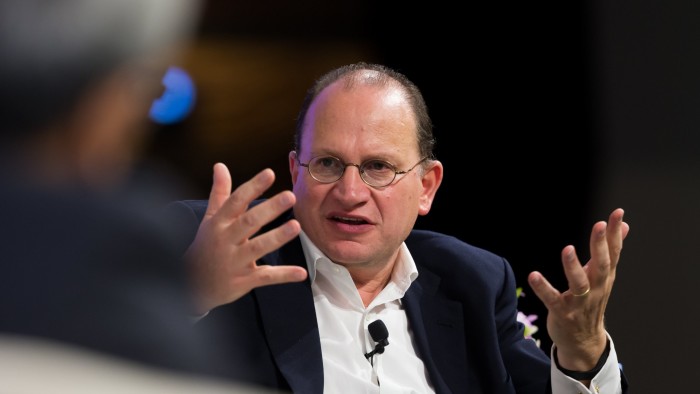HSBC picks an Asia expert in Mark Tucker

Roula Khalaf, Editor of the FT, selects her favourite stories in this weekly newsletter.
Mark Tucker once declared his life priorities were family, football and work — in that order.
But for colleagues and rivals of the incoming chairman of HSBC, the long-time insurance executive and former professional footballer is known for a relentless focus on the job in hand and an intolerance of time-wasting.
“I am direct. My focus has always been on value — and value for the company,” Mr Tucker, chief executive of AIA since 2010, told the Financial Times in an interview in 2015.
As the first outsider to be parachuted into the role of chairman of HSBC, that directness will be tested at a bank known for cultural conservatism and slow-moving decision-making.
The 59 year-old’s appointment has caught many in the bank off-guard, according to a senior executive in the group who said Mr Tucker has a reputation for being “aggressive — and capable”.
One HSBC board member predicted the AIA boss would bring a more urgent style to chairing the bank, in contrast to the affable and calm presence of Douglas Flint.
Hugh Young at Aberdeen Asset Management, a top 10 shareholder in both AIA and HSBC, said Mr Tucker was “a hard, direct person to deal with — and that is a good thing for HSBC”.
Mr Tucker oversaw a highly prosperous era for AIA driven by growing demand for insurance products in Asia.
Since AIA was spun out of AIG in 2010, his leadership produced a 50 per cent jump in revenues and profits and helped the insurer’s Hong Kong-listed shares rally 166 per cent — outperforming HSBC’s 42 per cent gain in London over the same period.
A senior executive in Hong Kong who worked with Mr Tucker on an AIA project said he is an “intense but very straight” negotiator.
“He’s got great integrity and he’s got a laser focus in the things that make a difference in the business to consumers,” he added. “He’s not into corporate-speak and PowerPoint presentations. He wants to have real conversations about the business and he wants to hear the truth, good or bad.”
HSBC was known to be keen to replace Mr Flint with an Asia hand familiar with a region that accounts for about three-quarters of pre-tax profits.
In Mr Tucker they have found one. He first worked in the region in the 1980s for Prudential and his enthusiasm for Asia’s business potential matches that of Tidjane Thiam, his replacement at Prudential in 2009, who left the insurer in 2015 to head Credit Suisse.
“I loved Hong Kong from the moment I first stepped in it. I can’t pretend for one second that I foresaw what would happen but I think I was immensely excited and caught up in what the opportunity was,” Mr Tucker told the FT in 2015.

Mr Tucker’s business career began in auditing at PwC, which he joined while still playing professional football at clubs including Wolverhampton Wanderers and Rochdale. He turned up to interview at the firm with two black eyes from a game the night before.
“Most prospective employers would have dismissed immediately any opportunity,” he said. “The fact that they offered me a job after that, I think it endeared me to them forever.”
Football is still no casual pastime, and he has borne well jokes about AIA sponsoring Tottenham Hotspur while his loyalty lies with London rival Chelsea.
At PwC he moved from auditing into the tax business, before shifting to the Pru’s asset management arm. There, an early mentor was Mick Newmarch, the outspoken and combative former chief executive who resigned amid fights with regulators in 1995. At one point Mr Tucker was his personal assistant.
“In a business sense he undoubtedly was the most important and influential person in my life,” Mr Tucker said. “He said to me that there are two agendas when you come into work. One is the business agenda, the second is the personal agenda and that we never talk about the personal agenda. If we do what is right for the business the rest will follow.”
Mr Tucker has had some experience in banking but it is limited. His stint as finance director of HBOS ended after two years in 2005 when he was tempted back to the Pru to take the helm. Between 2009 and 2012 he sat as a non-executive director of the Court of the Bank of England — the equivalent of the board of directors. Since 2012 he has been a member of the Goldman Sachs board.
Asked by the FT in 2008 for lessons he had learnt from the financial crisis, he cited focusing on fundamental business models, avoiding the distractions of exotic products and sticking to an organisation’s core strengths.
Asked again in 2015 while in his role at AIA, he said: “I think the only thing you’d add to that is the significance of liquidity in all of the occasions. I believe in staying very focused in the financial sector — not becoming a supermarket in any sense but staying very clear within core competencies and within areas where we can add significant value.”
When he took over the insurance group in 2010, AIA was overcapitalised and held the only wholly owned foreign insurance business in China, two advantages that helped lead to his accomplishments at the group, said Jan van der Schalk, an analyst at CLSA.
“His success is characterised by the same elements of all successful executives: he took advantage of a lucky break,” Mr van der Schalk said.
Comments